C++学习--点滴记录004
Posted 鲁棒最小二乘支持向量机
tags:
篇首语:本文由小常识网(cha138.com)小编为大家整理,主要介绍了C++学习--点滴记录004相关的知识,希望对你有一定的参考价值。
4 程序流程结构
C++支持最基本的三种程序运行结构:顺序结构、选择结构、循环结构
- 顺序结构:程序按顺序执行,不发生跳转
- 选择结构:依据条件是否满足,有选择的执行相应功能
- 循环结构:依据条件是否满足,循环多次执行某段代码
4.1 选择结构
4.1.1 if语句
作用: 执行满足条件的语句
if语句的三种形式
-
单行格式if语句
-
多行格式if语句
-
多条件的if语句
- 单行格式if语句:
if(条件) 条件满足执行的语句
示例:
#include <iostream>
using namespace std;
void test01()
int num = 0;
cout << "请输入一个数:" << endl;
cin >> num;
cout << "输入的数为: " << num << endl;
//if语句
if (num > 60)
cout << "数大于60" << endl;
int main()
test01();
system("pause");
return 0;
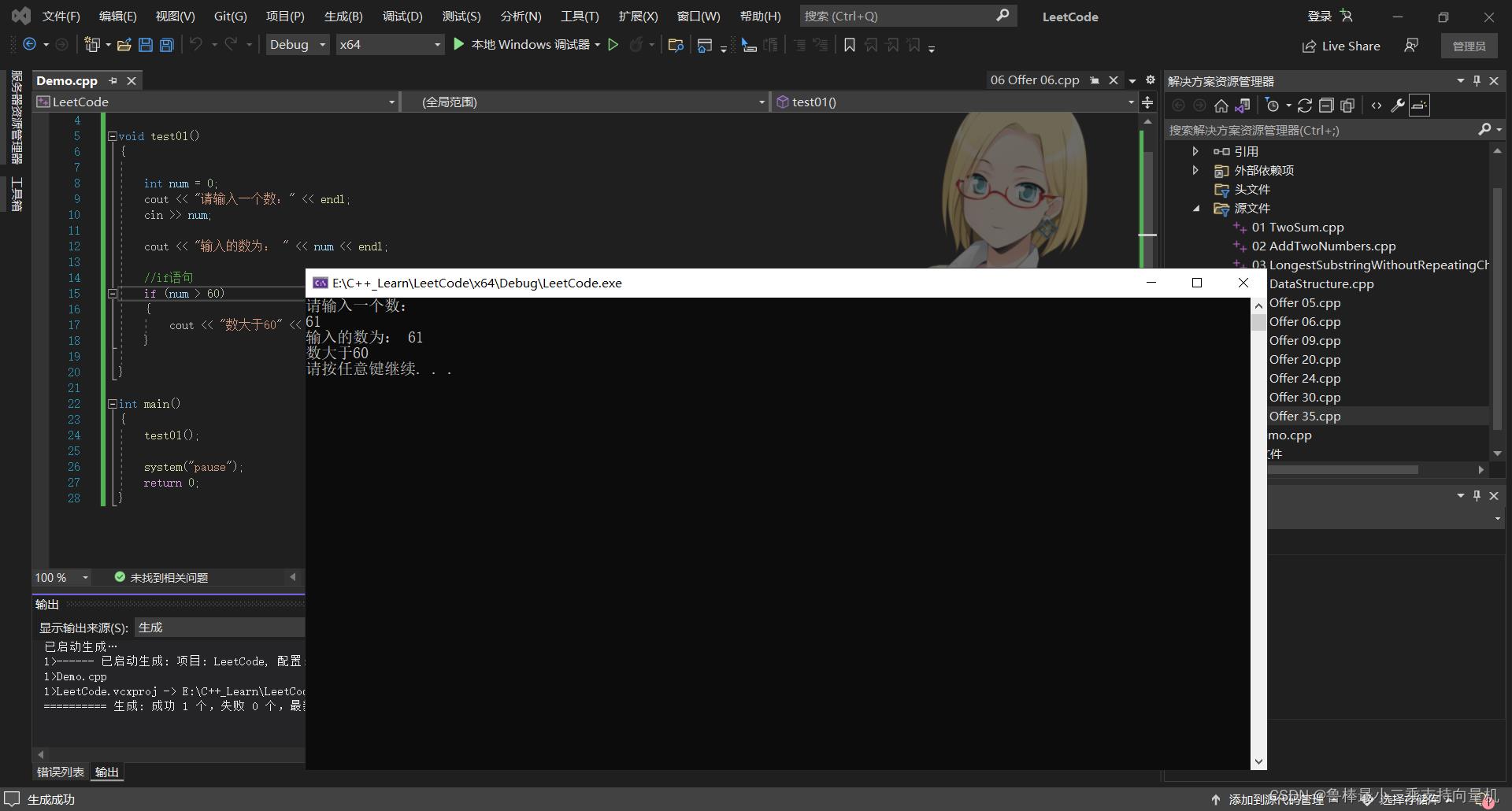
- 多行格式if语句:
if(条件) 条件满足执行的语句 else 条件不满足执行的语句 ;
示例:
#include <iostream>
using namespace std;
void test01()
int num = 0;
cout << "请输入一个数:" << endl;
cin >> num;
cout << "输入的数为: " << num << endl;
//if语句
if (num > 60)
cout << "数大于60" << endl;
else
cout << "数小于60" << endl;
int main()
test01();
system("pause");
return 0;
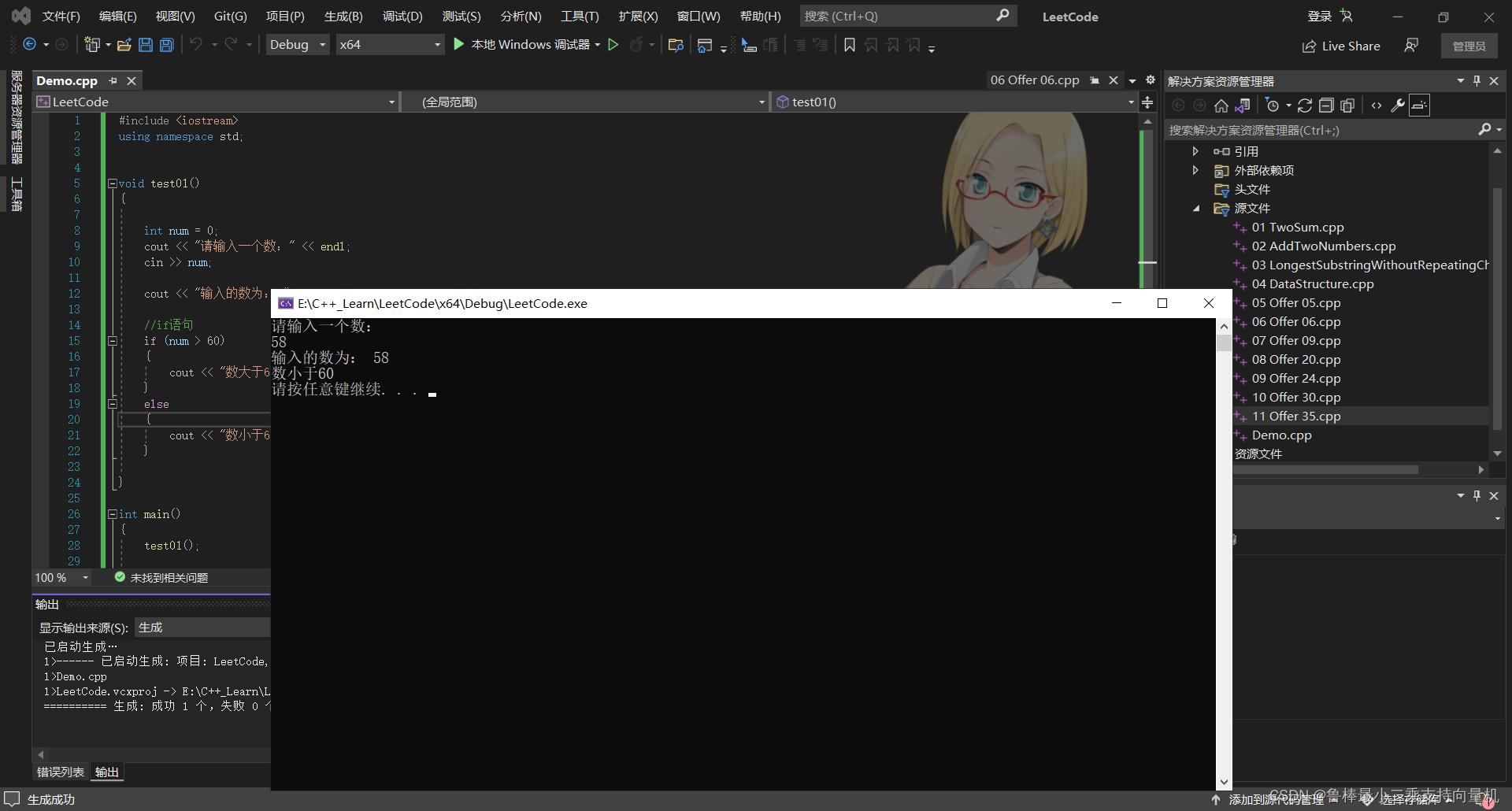
- 多条件的if语句:
if(条件1) 条件1满足执行的语句 else if(条件2)条件2满足执行的语句... else 都不满足执行的语句
示例:
#include <iostream>
using namespace std;
void test01()
int num = 0;
cout << "请输入一个数:" << endl;
cin >> num;
cout << "输入的数为: " << num << endl;
//if语句
if (num > 60)
cout << "数大于60" << endl;
else if(num>40)
cout << "数大于40,小于60" << endl;
else if (num > 20)
cout << "数大于20,小于40" << endl;
else
cout << "数小于20" << endl;
int main()
test01();
system("pause");
return 0;
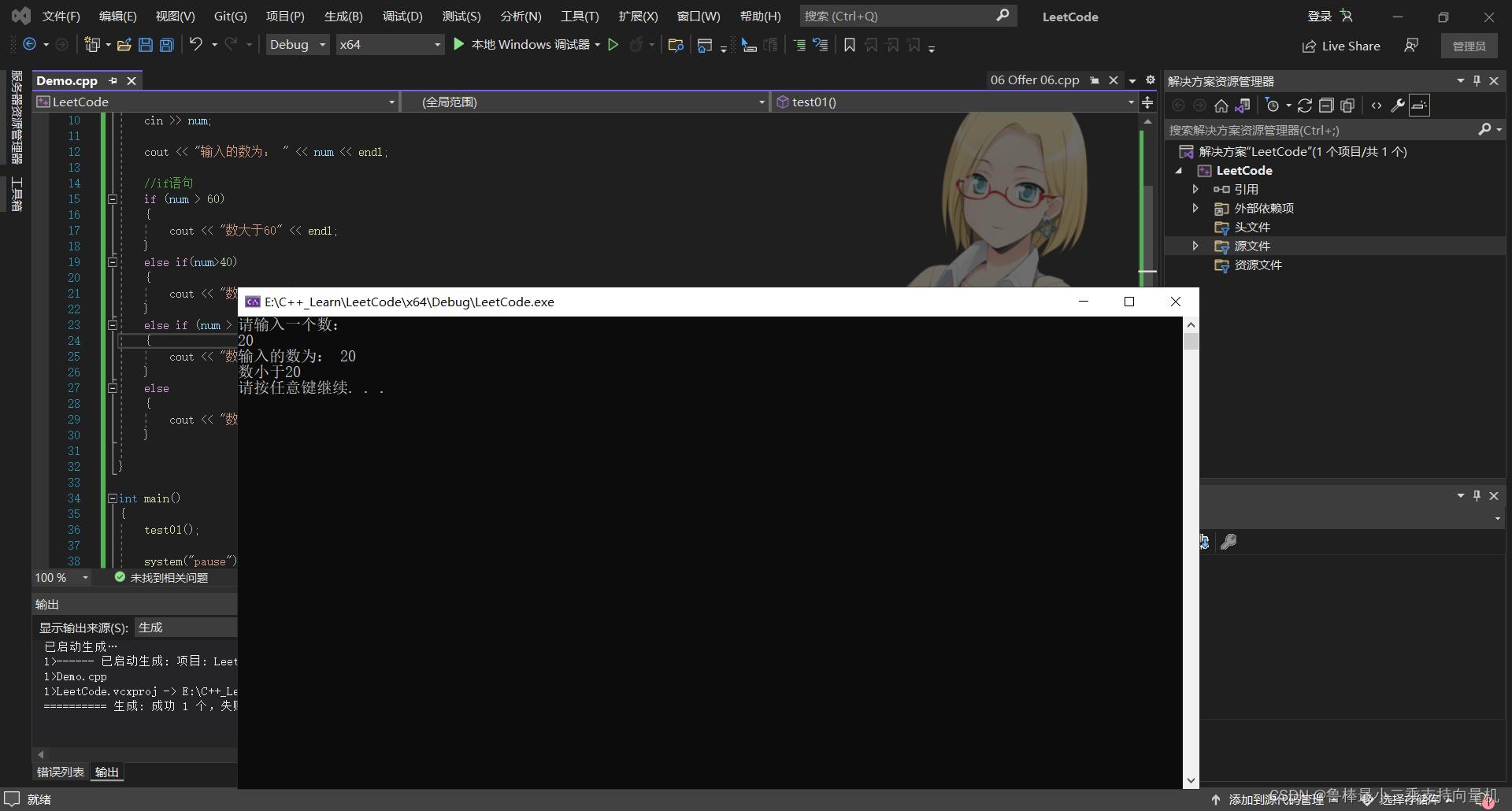
4.1.2 三目运算符
作用: 通过三目运算符实现简单的判断
语法:表达式1 ? 表达式2 :表达式3
解释:
如果表达式1的值为真,执行表达式2,并返回表达式2的结果;
如果表达式1的值为假,执行表达式3,并返回表达式3的结果。
示例:
#include <iostream>
using namespace std;
void test01()
int a = 10;
int b = 20;
int c = 30;
c = a > b ? a : b;
cout << "c = " << c << endl;
(a > b ? a : b) = 100;
cout << "a = " << a << endl;
cout << "b = " << b << endl;
cout << "c = " << c << endl;
int main()
test01();
system("pause");
return 0;
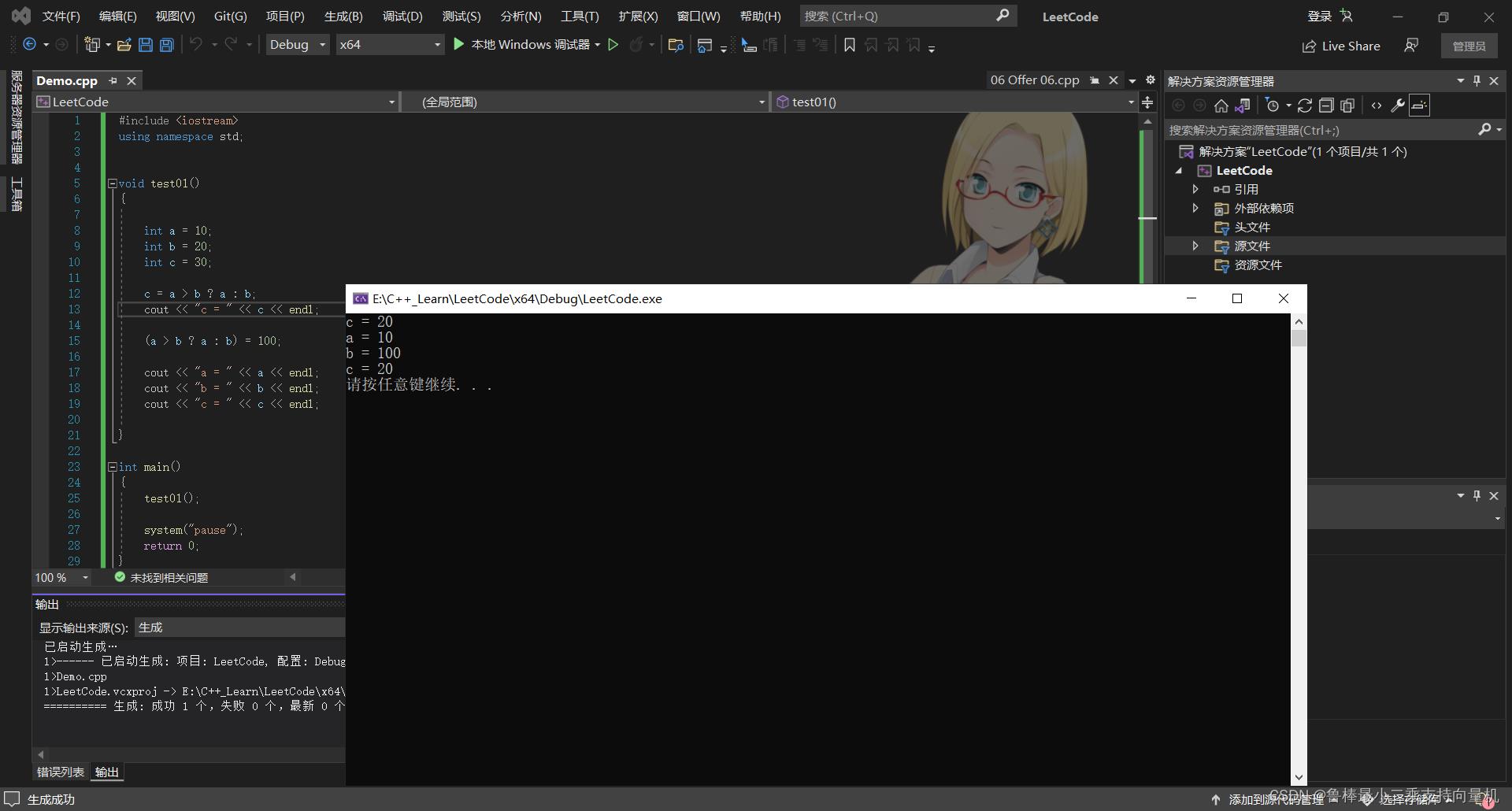
4.1.3 switch语句
作用: 执行多条件分支语句
示例:
#include <iostream>
using namespace std;
void test01()
int score = 0;
cout << "请输入分数" << endl;
cin >> score;
switch (score)
case 10:
cout << "10分" << endl;
break;
case 9:
cout << "9分" << endl;
break;
case 8:
cout << "8分" << endl;
break;
case 7:
cout << "7分" << endl;
break;
case 6:
cout << "6分" << endl;
break;
default:
cout << "0分" << endl;
break;
int main()
test01();
system("pause");
return 0;
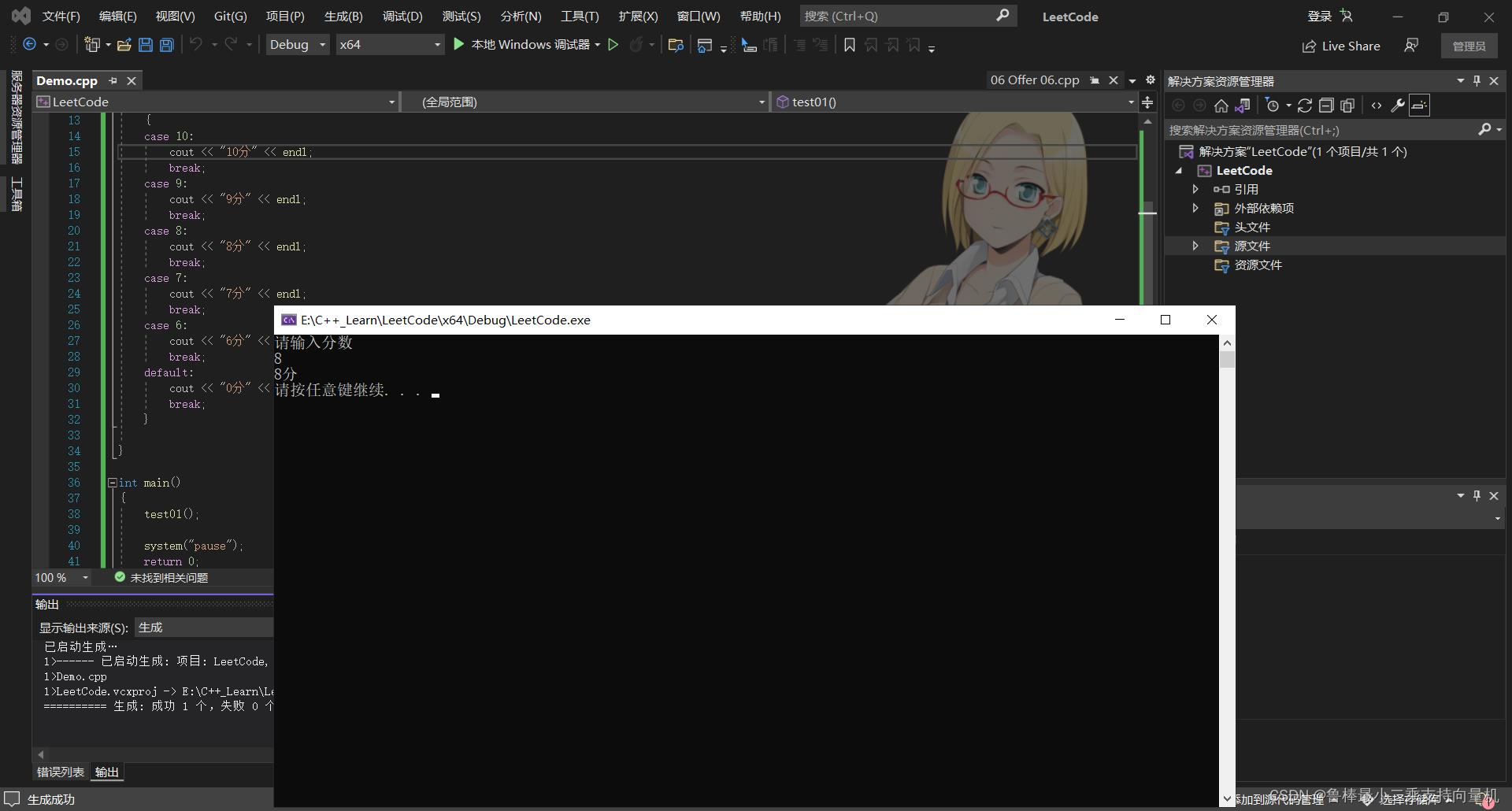
注意1:switch语句中表达式类型只能是整型或者字符型
注意2:case里如果没有break,那么程序会一直向下执行
总结:与if语句比,对于多条件判断时,switch的结构清晰,执行效率高,缺点是switch不可以判断区间
4.2 循环结构
4.2.1 while循环语句
作用: 满足循环条件,执行循环语句
语法: while(循环条件) 循环语句
解释:只要循环条件的结果为真,就执行循环语句
示例:
#include <iostream>
using namespace std;
void test01()
int num = 0;
while (num < 10)
cout << "num = " << num << endl;
num++;
int main()
test01();
system("pause");
return 0;
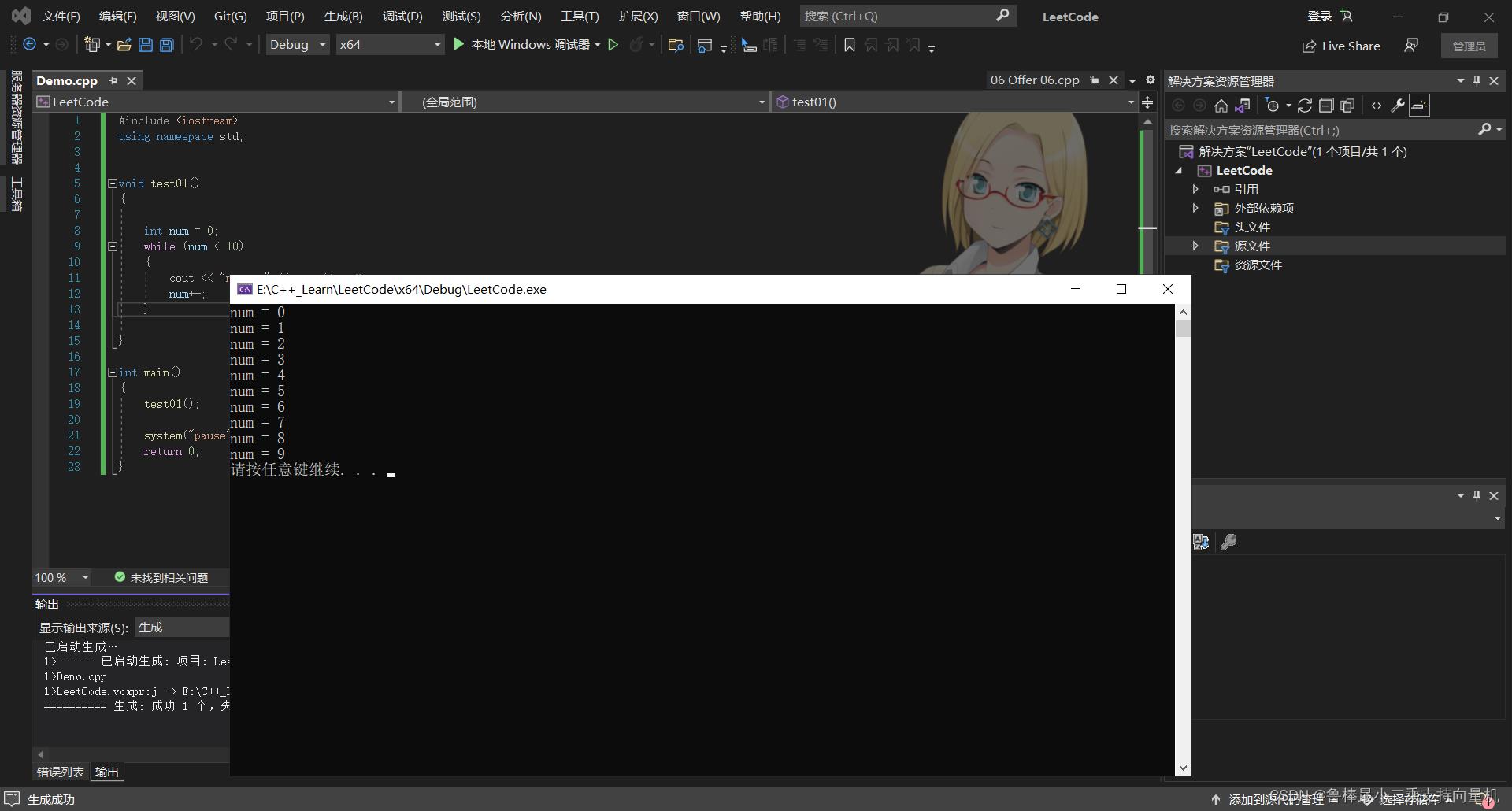
4.2.2 do…while循环语句
作用: 满足循环条件,执行循环语句
语法: do 循环语句 while(循环条件);
注意: 与while的区别在于do…while会先执行一次循环语句,再判断循环条件
示例:
#include <iostream>
using namespace std;
void test01()
int num = 0;
do
cout << num << endl;
num++;
while (num < 10);
int main()
test01();
system("pause");
return 0;
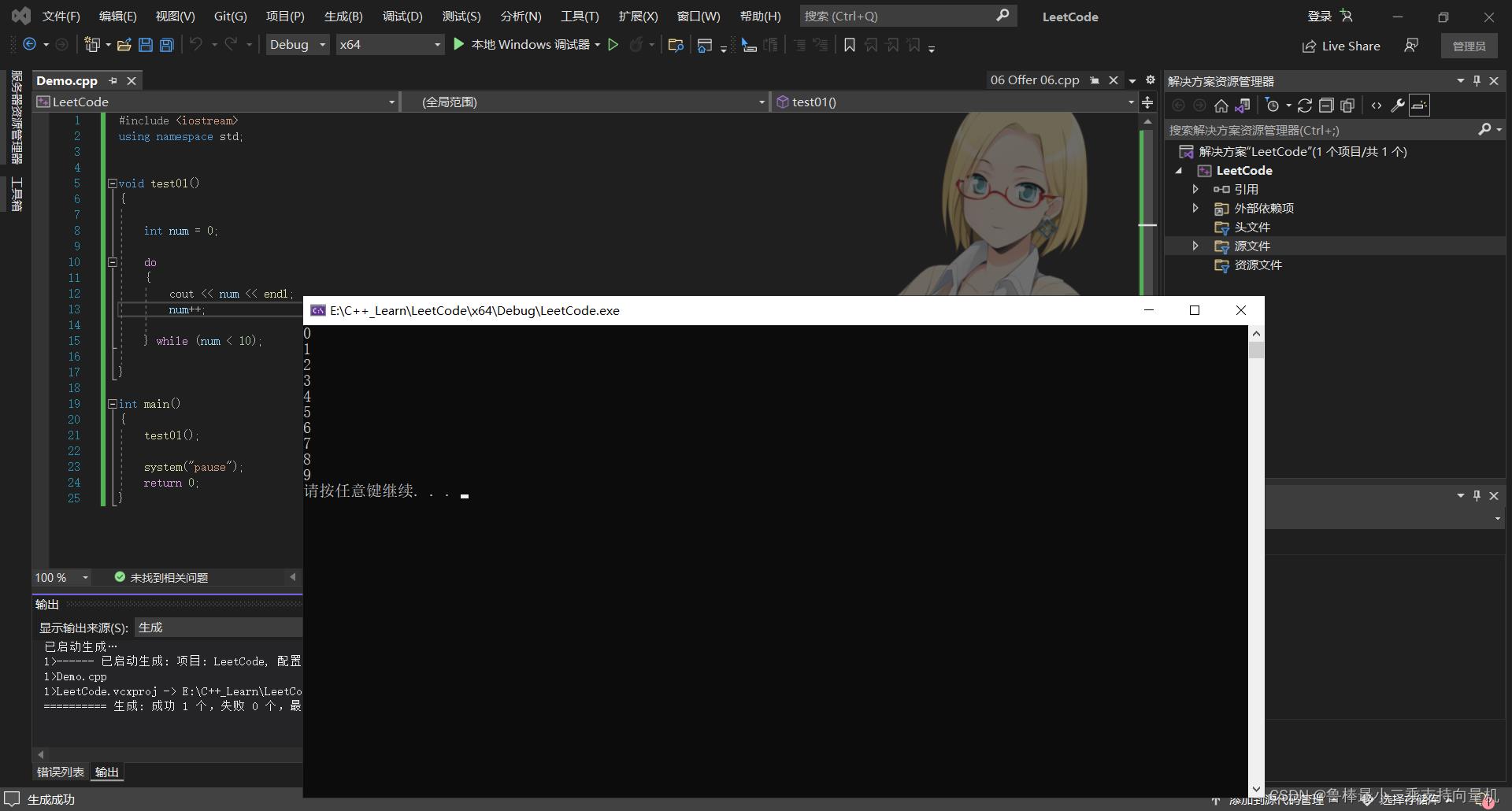
总结:与while循环区别在于,do…while先执行一次循环语句,再判断循环条件
4.2.3 for循环语句
作用: 满足循环条件,执行循环语句
语法: for(起始表达式;条件表达式;末尾循环体) 循环语句;
示例:
#include <iostream>
using namespace std;
void test01()
for (int i = 0; i < 10; i++)
cout << i << endl;
int main()
test01();
system("pause");
return 0;
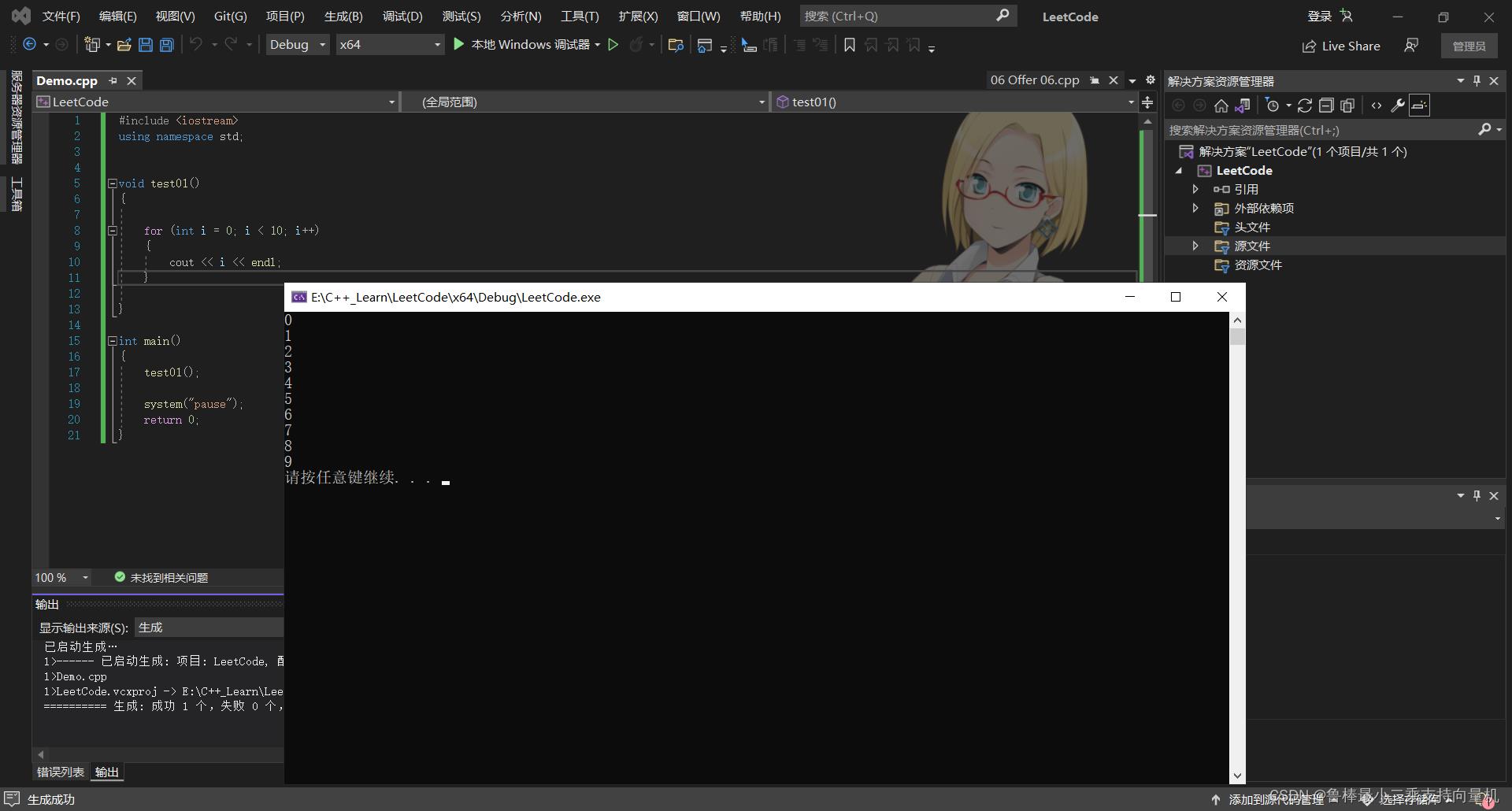
4.2.4 嵌套循环
作用: 在循环体中再嵌套一层循环
示例:
#include <iostream>
using namespace std;
void test01()
for (int i = 0; i < 10; i++)
for (int j = 0; j < 10; j++)
cout << "*" << " ";
cout << endl;
int main()
test01();
system("pause");
return 0;
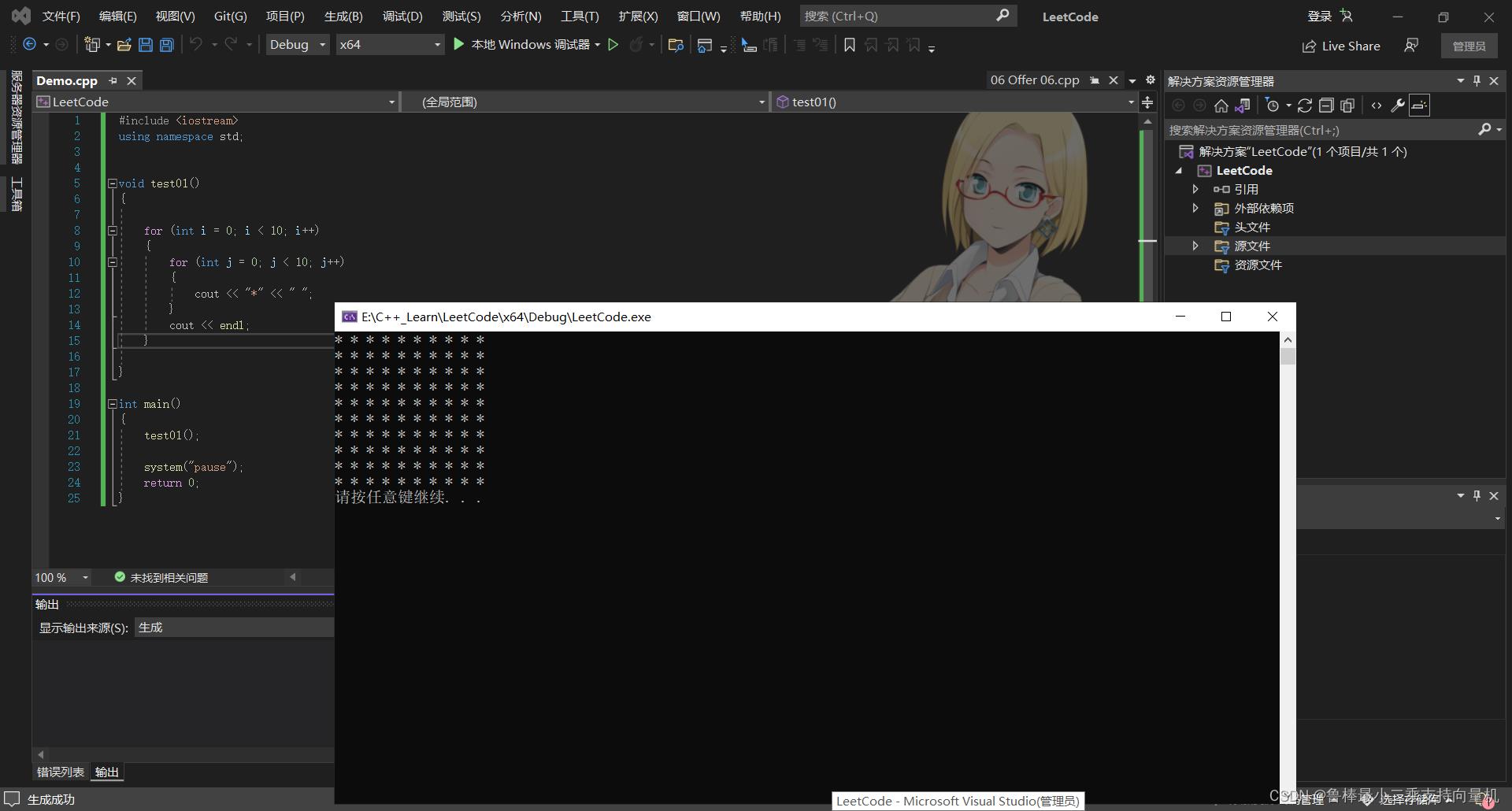
4.3 跳转语句
4.3.1 break语句
作用: 用于跳出选择结构或者循环结构
break使用的时机:
- 出现在switch条件语句中,作用是终止case并跳出switch
- 出现在循环语句中,作用是跳出当前的循环语句
- 出现在嵌套循环中,跳出最近的内层循环语句
示例1:
#include <iostream>
using namespace std;
void test01()
for (int i = 0; i < 10; i++)
if (i == 5)
break; //跳出循环语句
cout << i << endl;
int main()
test01();
system("pause");
return 0;
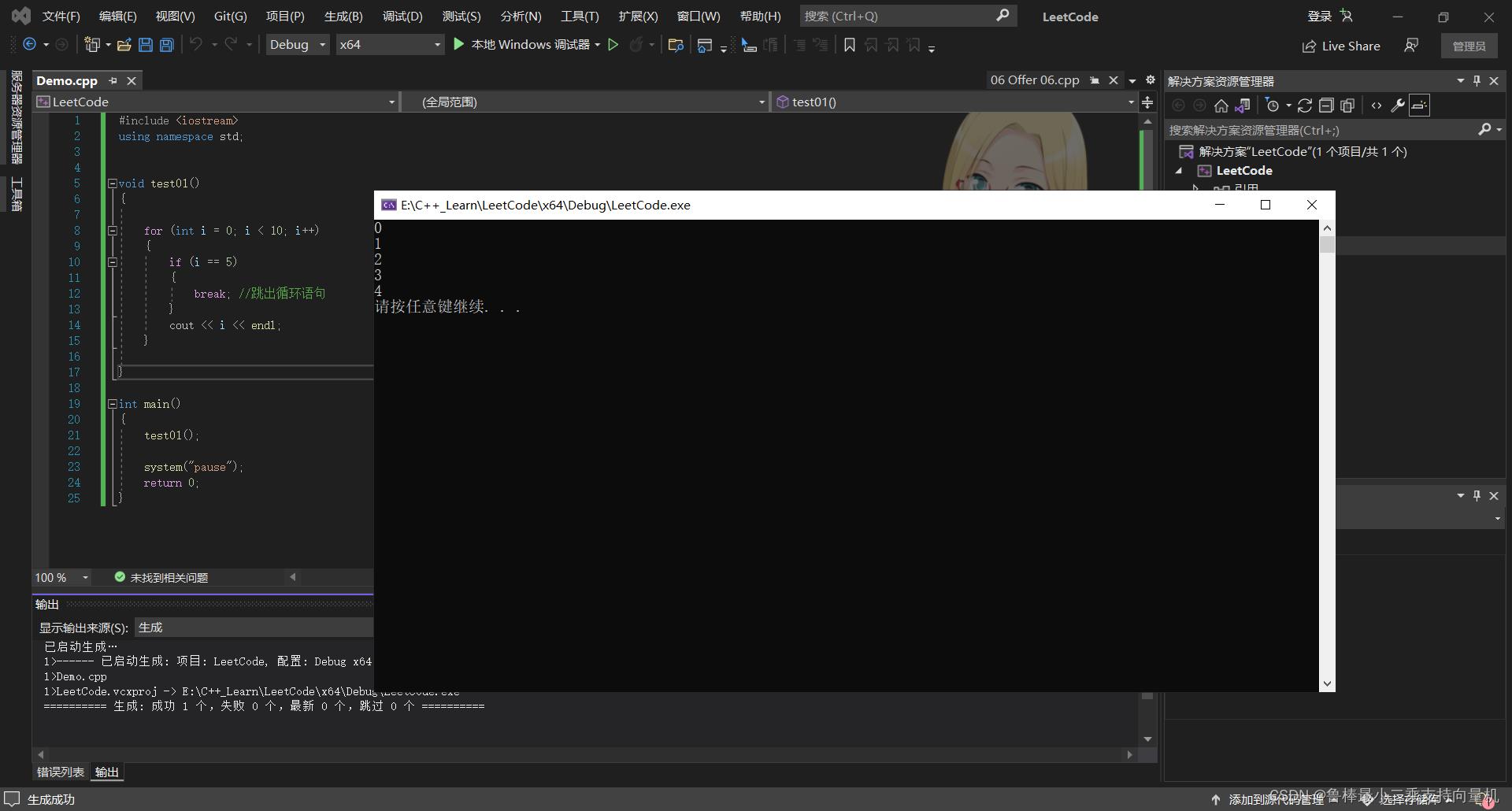
示例2:
#include <iostream>
using namespace std;
void test01()
for (int i = 0; i < 10; i++)
for (int j = 0; j < 10; j++)
if (j == 5)
break;
cout << "*" << " ";
cout << endl;
int main()
test01();
system("pause");
return 0;

4.3.2 continue语句
作用: 在循环语句中,跳过本次循环中余下尚未执行的语句,继续执行下一次循环
示例:
#include <iostream>
using namespace std;
void test01()
for (int i = 0; i < 10; i++)
if (i % 2 == 0)
continue;
cout << i << endl;
int main()
test01();
system("pause");
return 0;

注意:continue并没有使整个循环终止,而break会跳出循环
希望本文对大家有帮助,上文若有不妥之处,欢迎指正
分享决定高度,学习拉开差距
以上是关于C++学习--点滴记录004的主要内容,如果未能解决你的问题,请参考以下文章